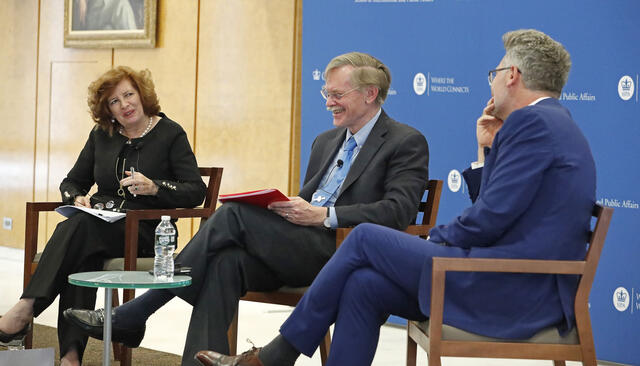
Silver Lecture: Robert Zoellick Offers Historical Perspective on American Trade Policy

“We should consider trade as an important factor in our country's relations with the world. And trade, of course, is a tale of domestic politics as well…. From the earliest days of the independence, Americans have always seen trade as an expression of liberty.”
So said Robert Zoellick, the former president of the World Bank Group, in giving the 2019 Gabriel Silver Memorial Lecture at Columbia SIPA. His remarks traced the development of American trade policy from the 18th century to the present, illustrating how the United States’ current trade relations came to be and underscoring his view of the link between trade and foreign policy generally.
Zoellick led the World Bank Group from 2007 to 2012—a challenging period that overlapped the global financial crisis—and served before that as U.S. deputy secretary of state (2005-06) and as U.S. Trade Representative (2001-05). He spoke on October 11 before a full room of almost 150 faculty members, policy students, and other trade enthusiasts.
In her introduction Dean Merit E. Janow highlighted Zoellick’s work to increase the World Bank’s capital resources, create new financial instruments, and support the bank’s anti-poverty program. She also emphasized his contributions to the development of U.S. policy toward China.
Early in his speech, Zoellick explained how the founders of the new United States thought that new rules for trade could help the international system.
“They didn't see trade solely as a question of economic efficiency,” he said. “The founders expected that trade would be the new nation's principal foreign policy.”
Zoellick highlighted how trade ranked at the top of the Congress’s agenda in 1776, discussed the influence of Adam Smith’s Wealth of Nations on Ben Franklin and Thomas Jefferson, and delineated how principles such as national treatments and most-favored-nation status came to be implemented in American trade policy.
He outlined how the Congress sharply raised average tariffs, moved on to Jefferson’s embargo of all U.S. maritime exports, and outlined how US trade policy came to be a result of its revenue and debt policies in the late 18th century.
Zoellick went on to highlight the sweep of trade policy over 200-plus years.
“Over the two centuries to follow, Americans continued to experiment with sanctions—of trade, and more recently, of finance—to weaken adversaries, or at least signal displeasure short of going to war,” he said.
Moving through the 19th century, two world wars, and the postwar economy, Zoellick reviewed the long arc from tariffs and protectionism to lowered barriers and greater exports. There were plenty of detours, fits, and starts along the way, but the end product was the contemporary structure of GATT, the WTO, and NAFTA, and the regime of increasingly free trade that it enabled.
“Americans [now] need to decide what type of international trade, technology and economic and environmental systems that they want,” said Zoellick as he moved toward the conclusion of his remarks. “The spirit of 1776 looked to Liberty, reformation, innovation, private initiative and opportunity. But the opponents of trade are always more outspoken, and they act with greater political intensity.”
Regarding environmental partnerships, Zoellick stressed that “without economic cooperation, cooperative action and other cross border problems, such as climate change or preserving biodiversity will become harder.”
After concluding his remarks, Zoellick joined Janow and European Institute director Adam Tooze for a brief discussion.
Tooze questioned how President Trump has balanced protectionism and business interests, and whether he is reorienting the Republican Party away from its traditional support for U.S. business and capital. Janow asked if Congress has delegated excessively its authority over international trade to the executive branch to negotiate bilateral trade agreements.
Zoellick emphasized the importance of pushing for future alliances and trade relationships tactically, and fielded questions from the audience on issues including inequality in the United States and the economic integration debate.
Zoellick is the latest in a long line of distinguished figures who visited SIPA to give the Silver Lecture. Previous speakers include Dwight Eisenhower, George Marshall, Rajiv Gandhi, Kofi Annan, Madeleine Albright, and Stephen Breyer.
— Shalini Seetharam MPA ’20